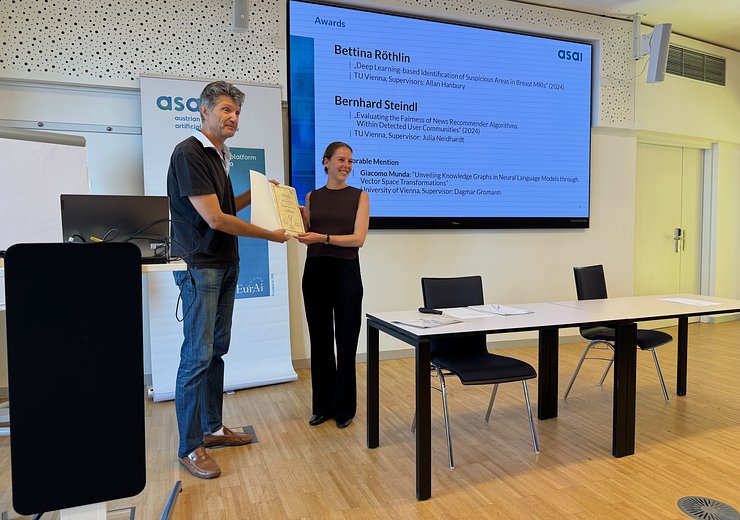Bettina Röthlin & Bernhard Steindl win ASAI Masterthesis Prize!
We’re delighted to announce that Bettina Röthlin and Bernhard Steindl have won the ASAI Best Masterthesis Prize 2025!

Picture: Julia Neidhardt
The Austrian Society for Artificial Intelligence (ASAI) honors exceptional young researchers for the best diploma or master’s thesis in Artificial Intelligence (AI) with the ASAI Prize. This year, the first prize was awarded to two winners: Bettina Röthlin and Bernhard Steindl from TU Wien Informatics. The ASAI Prize is endowed with €2000.
Bettina Röthlin’s master’s thesis, “Deep Learning-based Identification of Suspicious Areas in Breast MRIs”, explores how deep learning can support breast cancer risk assessment in high-risk women by analyzing breast DCE-MRI scans. Traditional screening methods, even when done annually, can miss early-stage lesions. To address this, Bettina developed a segmentation-based pipeline that identifies areas in MRI scans that are more likely to develop cancer within 6 to 24 months. She compared several deep learning models for their ability to highlight these high-risk regions, with DeepLabv3+ performing best, especially when enhanced with data augmentation and transfer learning. Features extracted from the segmentation probability maps were then used to train a Random Forest model to classify MRI slices as at risk or not. The results show that while traditional segmentation performance was limited, the probability maps were highly informative for risk prediction.
Bernhard Steindl’s master’s thesis, “Evaluating the Fairness of News Recommender Algorithms Within Detected User Communities”, investigates fairness in recommender systems by studying how different user groups receive recommendations. Recommender systems are commonly used to suggest content based on a user’s past behavior. However, these systems can treat certain groups unfairly, especially when the data is imbalanced. Rather than grouping users by demographics, Bernhard identified large user communities based on actual interaction data from the Austrian news platform “DER STANDARD”. User networks were built from actions like article clicks, comments, votes, and followers. Bernhard then applied community detection algorithms to find natural groupings within the network. The study compares how various collaborative filtering algorithms perform across these communities and finds that recommendation quality varies significantly between them. It also reveals that community detection itself can be unstable, with results depending on how the network is built. Overall, the thesis highlights that both the choice of algorithm and how users are grouped can impact fairness in recommendations, pointing to the need for more robust, equitable approaches in recommender system design.
About the Awardees
Bettina Röthlin is a mathematician and computer scientist working at the intersection of Artificial Intelligence research and development. Her current work focuses on advancing AI solutions for medical imaging, both in the private sector and through her ongoing research at the Computational Imaging Research Lab (CIR). She holds a BSc in Mathematics with Economics from University College London and an MSc in Data Science from TU Wien Informatics. She conducted her master’s thesis in collaboration with CIR under the supervision of Allan Hanbury, Head of the Research Unit Data Science at TU Wien Informatics, and Philipp Seeböck from the Medical University of Vienna. She has been recognized with the IMMOunited Future Pioneer Scholarship and named to the “TUW Under 30” list. During her studies, she was a Graduate Teaching Assistant in Medical Image Processing and gained international research experience as a Data Science for Social Good Fellow at the University of Warwick. Prior to her work in AI, she worked in the field of sustainable development in Austria after completing her MSc in Environmental Technology & International Affairs, for which she received the Die Presse Scholarship and the ARA Best Study Award.
Bernhard Steindl received his Bachelor’s degree in Software and Information Engineering and his Master’s Degree in Data Science from TU Wien Informatics. Bernhard worked on his master’s thesis with the Christian Doppler Lab for Recommender Systems (CDL-RecSys) and was supervised by the head of the CDL-RecSys, Julia Neidhardt, and Thomas Kolb. He investigated the fairness in news recommender systems by focusing on behavioral communities derived from real user interactions on the news platform Der Standard, rather than relying on demographic attributes. Bernhard analyzed how different network construction methods influence user community detection and how recommendation quality varies across these communities. A paper based on the work in his master’s thesis has been accepted for the 33rd ACM Conference on User Modeling, Adaptation and Personalization (UMAP 2025). He currently works as a Software Engineer and is particularly passionate about machine learning.
Curious about our other news? Subscribe to our news feed, calendar, or newsletter, or follow us on social media.





